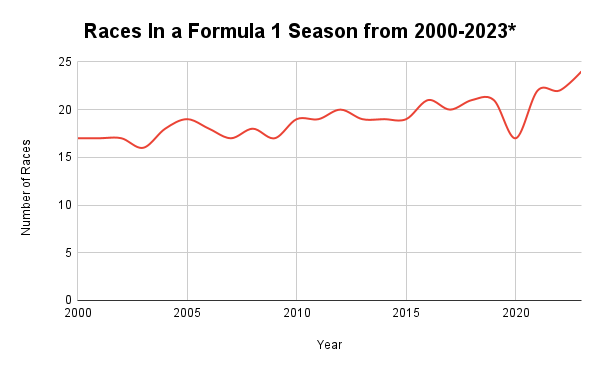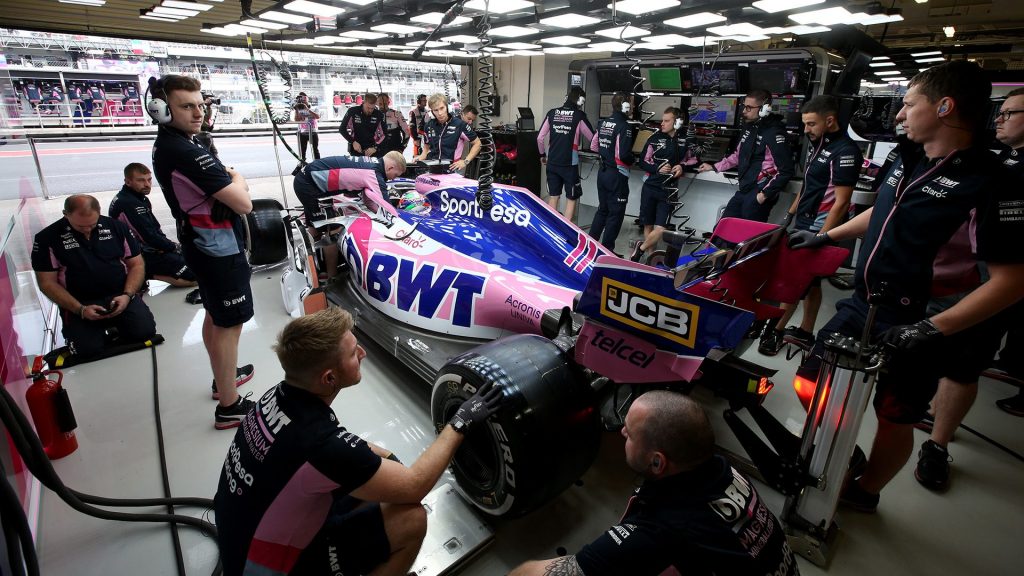“Your eyes are bigger than your belly” – Mother Dre, as I reach for the second slice of cake
Ever remember the phrase your mother told you, that you can have too much of a good thing? Well with Formula 1’s ever-growing expansion, I’m starting to think she was onto something.
This is the second straight “longest-ever” F1 season, at 22 races. 2022 will have nine back-to-back weekends and it would have had two triple headers down the stretch if Russia didn’t decide to start another war.
With today’s announcement of the 2023 F1 calendar, we’re now looking at potentially 24 races, jumping up another two. China is provisional, but Qatar returns for definite after its World Cup-focused hiatus and Las Vegas makes it three trips to the United States. Again we have two triple-headers on either side of the summer break. And for some batshit reason, Belgium is in July for the first time ever, on the same day as the 24-hour race. Who’s bright idea was that?
And the way F1 is treating its favourite rounds, a lot of the newer tracks aren’t going anywhere. Saudi Arabia came into the fold on a 15-year contract. Bahrain just got a 14-year extension. Qatar came in on a 10-year deal. Catalonia’s on board until 2026. Heck, even Imola, originally a pandemic stand-in, is now confirmed until 2025.
When Chase Carey’s moustache became F1’s CEO after Liberty Media bought Bernie out, he said he wanted the sport to be “25 Superbowls”. And Stefano Domenicali looks to be following in his footsteps. Currently, we’re right at the 24-race limit for a season. But I think by the next Concorde agreement, we could go beyond that. With the sport already trying and failing Vietnam and the stories of a Kyalami return refusing to go away, it seems F1 is keen to still widen its net further, even with France sacrificed to compensate. With the way we’ve ballooned from teenage-numbered calendars to touching mid-life crisis numbers in the last two decades, I fear the first chance the sport gets, it’s going to up that count further. Is that a good thing, though?
It’s obvious why F1 is doing this. Classic capitalism. More races mean more money. As the world moves back into relative normalcy, Silverstone still sold 142,000 seats for its 2022 GP and cited unprecedented demand for tickets, even in a huge UK cost of living crisis where inflation rates could reach 13% next year. And as much as I found their “dynamic pricing” for next year’s race appalling, I fear many people still snapped those tickets up because FOMO is a motherfucker.
You can further read the tea leaves via the sport’s recent additions. America will have three races next year. The long-term viability of the venue is still up in the air; but Miami, fake marina and all, sold out despite ticket prices going north of four digits. They’ve already added another 15% or so to those wanting to retain their seats for next year. And don’t forget, Formula 1 was the direct promoter of the race. So no shit, they’re going to take their sport to places with more disposable income.

Despite F1 racing in Austin for a decade and a 400,000 fan turnout over last year’s weekend, there’s always room for more when an American push was at the forefront of the sport’s agenda half a decade ago. There’s already talk that Vegas next year will have VIP packages in the $120,000 range. F1 knows where their bread is buttered and it isn’t in Texas.
There’s been talk surrounding the idea of rotating certain races on the calendar. So maybe 20 rounds, but 4 or 5 slots can rotate between certain venues. France pretty much let the cat out of the bag last month when they announced they’d hope to return to the calendar on a rotational basis. I’m not hugely against it, but I do wonder with many of these races losing money as it is, and/or promoted by countries’ governments for tourism’s sake, is taking away half their biyearly income going to help? Will said governments be so keen to prop up their countries’ race if they’re only getting 50% of the benefit? I’m not sure how sustainable that model will be for “2nd tier” races long-term.
I also wonder if there’s a breaking point for us as consumers of Motorsport. When I was growing up, F1 calendars were 16 races or so. We’re now at 50% more than that, and trending up. Does it get to a point where there are so many races, they matter less? Where you might pick and choose which ones to watch if you’re juggling other sports, or life in general? Do we get to something like NASCAR where you might skip a round like Dover, but come back for Talladega?
It reminds me a lot of when I was a teenager and a huge UFC fan. They were developing huge star power in the early 2010s with Brock Lesnar, Georges St. Pierre and Anderson Silva drawing big Pay-Per-View numbers. As they grew, they doubled, even trebled the number of numbered cards they had per year. A PPV every six weeks became every three weeks. Maybe even every fortnight.
Now I wasn’t a PPV buyer, I was buying the DVDs, but when you’re on a 4-hour contract working in a Matalan warehouse, that’s a luxury you eventually can’t afford. Time is the greatest currency we have, maybe even more so than money. I know the models are different compared to F1 but the risk of over-saturation always scares me, and I think it’s certainly done a number on MMA’s popularity over the years.

But deeper than the commercial side of it, as the years have gone by, it sounds like the expansion of the sport has caused some real genuine human harm. The signs were always there. I remember when Martin Whitmarsh was in charge at McLaren saying he’d have to hire a second crew if we went past 20 races. We’re now comfortably beyond that and more hiring isn’t going to come easy in the era of the cost cap, where an extra body is going to be 30 grand a year and probably more.
Don’t forget that 2021’s calendar was also freakish in its length. We raced deep into the bowels of December. And as a knock-on effect, we had a shorter off-season to rest too. I’m very unfortunate to have friends in this industry, working on social media, travelling on the road as journalists, or other parts of a team. It’s a tough existence at the best of times, and I know many people I consider friends and loved ones that have quit due to burnout. Not being able to see their friends, their families, or their partners for extended periods. Thousands of miles on the road, or in the air. Then working a high-pressure, performance-based job on 100+ hour long weeks by the time we see Hamilton, Verstappen or Leclerc cross the finish line. I can see how that might break people. For all the talk of F1 bringing the travel down; after 23 rounds of 2023, the final double header involves an 8,000-mile trip through eight time zones.
I distinctly remember the anonymous report into the Formula 1 paddock that the Motorsport Network posted at the end of last year. Admittance of multiple mechanics jacked up on painkillers. Toxic working environments. Teams strongly discouraged staff from taking COVID-19 tests in the bubble because the bosses didn’t want the inconvenience of potential self-isolation.
It’s doubly shit when we as an audience just don’t see the empathetic side of that. Because F1 is an aspirational job. Look, as said before, I manage a betting shop full-time. It’s precisely NOT the sort of role you tell your Year 3 teacher when you’re 7 years old that it’s what you want to be when you grow up. You tell them you wanna be an astronaut, or a doctor, or a police officer. You fall into gambling. An F1 engineer is probably on the complete opposite end of the scale.
Working in F1 is something that on the outside, I think a lot of people would genuinely love the idea of. I would know, I used to be one of those people. But whenever I see someone who works in or around the sport mention on social media that their job can be just as hard or as unforgiving as your least favourite retail chain, there’s always some insensitive wanker in their mentions who will tell you to “man up” or remind you of how “privileged” they are. Sadly, it’s far easier these days to make an already down person feel even more like shit than have a more difficult conversation as to what could be done to make things better.

I know Abu Dhabi 2021 is like beating a dead horse when it comes to F1 discourse but bear with me. As much as it was no doubt the most negatively received title decided in 25 years, it was also watched by 13 million people in the UK and Netherlands alone. All those people who pretended to cancel their F1 TV subscriptions or threatened to boycott the “corrupt” sport., are all still here, and they’ve had their biggest spike of new fans in recent history. We’ve not collectively reached our breaking point as an audience yet and if a mismanaged title decider that many people still call a “fix” with their full chests wasn’t enough… then I don’t know what is.
And that’s the problem. Racing into December didn’t change things. Triple-headers and four races in a month haven’t. We’re staring 24 races a year dead in the face, but the key ways we can take a stand, like putting the remote down, haven’t happened. If anything, it’s the opposite. Saudi Arabia, the socially acceptable round to diss due to sports washing, was the most watched F1 race on US Cable since 1995. I’m not sure we’ll ever get to the point where F1 “condenses” itself. I mean heck, you’re reading the post of an obscure, former YouTuber talking about it, with a collective audience of… maybe a few thousand people on a good day. Kind of says it all.
But the cracks are starting to show as the ground floor of the sport’s stakeholders start questioning how far we’ve come, and how much is still to come. We will keep on trucking because that’s what F1 does. A LOT of wheels have to fall off this machine for it to slow down. And I fear that that machine that F1 has become, is also a huge part of the problem.



